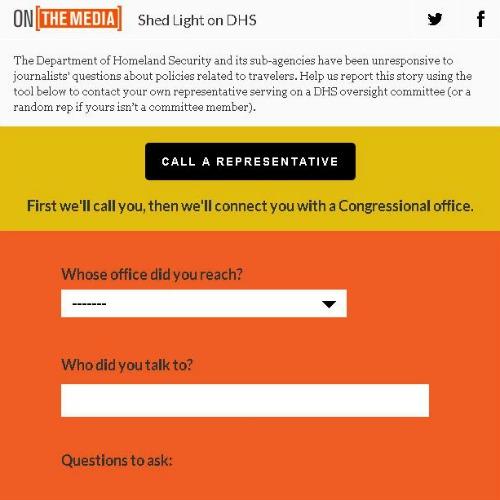BROOKE GLADSTONE: Currently, congressional oversight of the vast DHS bureaucracy is divided among dozens of House and Senate subcommittees, all of which seem to get into each other's way. That's according to former congressman and current member of the US Homeland Security Advisory Council, Lee Hamilton. Nevertheless, he says that if he were Sarah, Congress would be the first place he’d go.
LEE HAMILTON: I would go to my representatives, I’d say, look, this is outrageous. I was treated poorly. I tried to get it corrected. They didn’t do anything about it. I want you to write a letter to the secretary of the DHS. I want you to make sure that in hearings the bureaucrats are asked about this and why it happened.
BROOKE GLADSTONE: In response to our producer Sarah Abdurrahman's experience at the border, we’ve gotten comments from people around the country. Does it work if you’re approaching your congressman on behalf of someone else?
LEE HAMILTON: There's always more political pressure in greater numbers, so you want to organize the people who are complaining. You want to contact as many members of Congress as possible. Pressure, that's what you have to do. You have to create pressure in the Congress and pressure against the DHS to perform properly. That's part of the process. It happens every single day, or at least it should, in a representative democracy.
BOB GARFIELD: So how to apply pressure to the Department of Homeland Security? How easy is it for constituents to contact so many members of Congress? Well, WNYC's data news guru John Keefe has created a tool for OTM listeners to do just that. John, welcome back to the show.
JOHN KEEFE: My pleasure.
BOB GARFIELD: What did you build?
JOHN KEEFE: Well, we just made a very simple little tool. It's actually an advocacy calling system run by mobile commons. We’re using it a little bit differently for journalistic purposes, and we’ve loaded in the names of the representatives who are on the House Committee on Homeland Security and the House Judiciary Committee. And if one of those folks is your representative, when you click on the button we will call you and then we will call your representative. If your representative isn’t one of these committees, it will connect you with somebody else who is on that Committee.
BOB GARFIELD: This is done with a mouse click, right?
JOHN KEEFE: It's a simple mouse click on this form. And then what we did is we made it so you can be the reporter. In fact, we have the questions to ask the folks who answer at the congressional offices. We have three questions for you, and you get to report in to us what your representative or another representative who you reached, what their office says in response to these questions.
BOB GARFIELD: All right, now John, I have to ask this question: This sounds like a wonderful crowdsourcing of journalism and, you know, I'm all for it, of course, but it also has echoes of what they call astroturfing where, in order to create the appearance of a grassroots movement, organizations will get a number of people to click on a button or fill out a form and all of a sudden they’re represented as an angry population with pitchforks and flaming torches.
JOHN KEEFE: Well, the reason it seems that way is that this is exactly the kind of tool that is used for exactly that kind of astroturfing. What we’re doing in this case, we hope, is to try to get some answers. Journalists have been asking these questions, as you guys have been talking about, and not getting answers. So if you are a constituent calling your representative, do you have more leverage than a journalist might? We’re going to find out.
BOB GARFIELD: And once we have the information, what do you propose that we do about it?
JOHN KEEFE: Well, one of the questions on the form is whether or not the congressperson would support a call for a public hearing about this issue. So one thing we might be able to do is to say, hey, our listeners called you all and you said you'd be in favor of such a hearing, and if we can pull that all together, maybe there’s a possibility for a hearing about transparency on this. That’s one of the things that could come of this.
BOB GARFIELD: Well, I certainly hope that our listeners in the aggregate are more successful at getting answers from the government than we have been as a news organization, because so far we’ve hit a stone wall. John, thank you so much.
JOHN KEEFE: My pleasure, Bob.
BOB GARFIELD: John Keefe is WNYC's Senior Editor for Data News and Journalism Technology.
